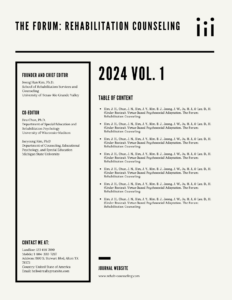
Journal
The Forum: Rehabilitation Counseling (TFRC) is managed by a group of three prominent rehabilitation experts, namely Dr. Jeong Han Kim, Jina Chun, and Jaeyoung Kim. The primary objective of TFRC is to establish an academic platform that facilitates scholarly discussion, with a specific focus on advancing theoretical and conceptual research pertaining to the field of rehabilitation counseling. TFRC is a high quality, open-access scholarly journal subject to a rigorous peer-review process, and it is released on an annual basis.
Aims and Scope
The Forum: Rehabilitation Counseling (TFRC) primarily centers around theoretical research reports within the field of rehabilitation counseling. However, the journal also welcomes various forms of contributions that augment the professional knowledge base in this area. Examples of such contributions include scholarly articles elucidating pioneering theories or models, dialectical discussions presenting contrasting viewpoints on a contemporary contentious issues challenging the field, or perceptive expositions addressing significant concerns.
Editorial Board
- Chief Editor. Jeong Han Kim, PhD in Rehabilitation Psychology. School of Rehabilitation Services and Counseling, University of Texas-Rio Grande Valley.
- Associate Editor. Jina Chun, PhD in Rehabilitation Counselor Education. Department of Rehabilitation Psychology and Special Education. University of Wisconsin-Madison.
- Associate Editor. Jaeyoung Kim, PhD in Rehabilitation Counselor Education. Department of Counseling, Educational Psychology, and Special Education. Michigan State University.
Submission Guidelines
Manuscripts should adhere to the formatting guidelines specified in the Publication Manual of the American Psychological Association (7th ed., 2020). It is imperative that manuscripts conform to the prescribed formatting criteria outlined below.
- The title page should include the following elements: (a) the title of the article; (b) the names of all contributing authors; (c) authors’ affiliations, which should include the full mailing address for the corresponding author and the email addresses of all authors; and (d) any acknowledgments, financial disclosure information, author notes, or other textual content that may potentially reveal the identities of the authors to reviewers.
- The document is formatted as 8.5 by 11 inches, with 1-inch margins. The text is double-spaced and left-aligned, using Times New Roman font with a font size of 12 points. Word text documents are the required file format for both text and table files. PDFs are not acceptable.
- It is recommended that each table be initiated on a separate page. It is recommended that tables be formatted with single spacing. To do this, it is advisable to utilize the table formatting features available in Microsoft Word.
- Authors are responsible for obtaining written permission for content, such as figures, tables, and extended quotes, whether used directly or adapted from another source. Authors are also responsible for covering any fees that may be required by the copyright holder.
- The acquisition of permissions frequently necessitates a substantial duration for approval, so it is advisable to initiate the request procedure in a timely manner. Obtaining authorization is also necessary when using material from software or the Internet. To obtain a Permissions Request form, please visit the Instructions & Forms section on the website https://rehab-counseling.com/TFRC/permission. It is important to thoroughly review the permissions to ascertain the language used allows publication in various media, encompassing both electronic and print mediums. Failure to obtain permission may result in the removal of the time or article.
- Supplemental materials. The determination of whether to include supplementary material will be made by the editor as a component of the article acceptance procedure.
Manuscript Submission
The author(s) should prepare two manuscripts: one that includes comprehensive author information as explained in the submission guideline and another that lacks any author information. Subsequently, the author(s) will transmit these two documents to: tfrc.rcinsight@gmail.com
Peer-Review Process
The main objectives of the TFRC review process are to accurately convey the authors’ voice and perspective within the realm of rehabilitation counseling. The TFRC discourages the review practice of requiring authors to revise their work only based on the reviewers’ perspective. Instead, our attention is directed towards the following.
- Is the journal article accessible and comprehensible for rehabilitation professionals or students who may have limited familiarity with the subject matter being addressed?
- Do the assertions adequately address the existing body of literature?
- Do the statements made in the study have sufficient support from the existing literature? If not, what additional evidence is required?
- Does the statistical examination of the data demonstrate soundness?
- Does the data accessibility align with the expected standards of your scholarly community?
- Is it possible to modify the manuscript to acknowledge and mitigate any potential limitations?
Editorial Decision
Your article will undergo evaluation by the Editor, taking into consideration the feedback provided by the reviewer(s). The Editor may request additional assistance from the journal’s Editorial Board or another reviewer/adjudicator and may contact you for further clarification on your report. Please be aware that the Editor will weigh various factors when reaching a final decision, and this decision may not necessarily align with your opinion. This does not suggest that your feedback was disregarded; rather, it indicates that there were other pertinent considerations that significantly impacted the decision-making process.